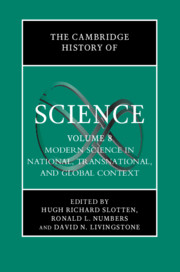Book contents
- The Cambridge History of Science
- The Cambridge History of Science
- The Cambridge History Of Science
- Copyright page
- Contents
- Notes on Contributors
- General Editors’ Preface
- 1 Introduction
- Part I Transnational, International, and Global
- 2 Science and Imperialism since 1870
- 3 The Geomagnetic Project: Internationalism in Science between the French Revolution and the Franco-Prussian War
- 4 International Science from the Franco-Prussian War to World War Two: An Era of Organization
- 5 Internationalism in Science After 1940
- 6 International Science in Antarctica
- 7 Missionary Science
- 8 Museums of Natural History and Science
- 9 National Scientific Surveys
- 10 Expeditionary Science
- Part II National and Regional
- Index
9 - National Scientific Surveys
from Part I - Transnational, International, and Global
Published online by Cambridge University Press: 21 March 2020
- The Cambridge History of Science
- The Cambridge History of Science
- The Cambridge History Of Science
- Copyright page
- Contents
- Notes on Contributors
- General Editors’ Preface
- 1 Introduction
- Part I Transnational, International, and Global
- 2 Science and Imperialism since 1870
- 3 The Geomagnetic Project: Internationalism in Science between the French Revolution and the Franco-Prussian War
- 4 International Science from the Franco-Prussian War to World War Two: An Era of Organization
- 5 Internationalism in Science After 1940
- 6 International Science in Antarctica
- 7 Missionary Science
- 8 Museums of Natural History and Science
- 9 National Scientific Surveys
- 10 Expeditionary Science
- Part II National and Regional
- Index
Summary
This chapter explores the significance of scientific surveys of national territories in the development of modern science. National surveys have necessarily been linked to the centralizing tendencies of nation-states beginning especially during the eighteenth century. The surveys were considered scientific because they used the principals and methods of empirical physical science, astronomy, and abstract mathematics to produce precise and rigorous results. Surveying and mapping of national territories fulfilled an Enlightenment desire to rationalize and bring order to nature.
- Type
- Chapter
- Information
- The Cambridge History of Science , pp. 124 - 136Publisher: Cambridge University PressPrint publication year: 2020

